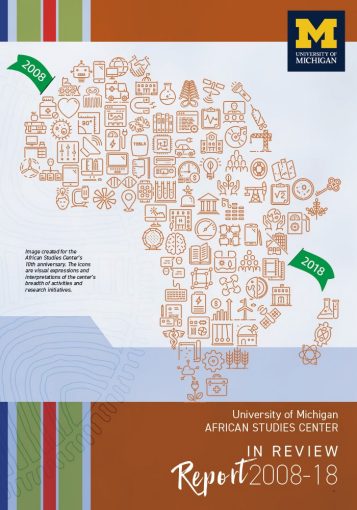
The African Studies Center (ASC) at the University of Michigan provides strategic guidance and coordination for Africa-related education, research, and training activities on campus, and promotes opportunities for collaboration with African partners on the continent.
The center’s mission:
- Deepen and expand scholarly and educational partnerships between U-M and African institutions
- Support exchanges of students, faculty, and staff between U-M and African institutions
- Enhance the study of Africa, past and present, within the U-M curriculum
- Connect faculty and students working in/on Africa from all colleges and units on campus
- Foster interdisciplinary research to find imaginative solutions to contemporary social, cultural, medical, technological, and environmental problems
- Serve as a public resource on Africa and Michigan’s involvement with it for the state and local community
ASC is a member of the International Institute and was established in July 2008. The center is organized around five primary research initiatives and programs that have been funded separately by the Office of the President and different stakeholders on campus.
African Heritage and Humanities Initiative (AHHI)
AHHI supports research related to the arts, humanities, and interpretive social sciences, which highlights the dynamic, contested process by which African cultures and histories are made.
African Social Research Initiative (ASRI)
ASRI promotes social science research on democratic governance and distributive politics; income dynamics and poverty; and gender, health, and development.
Ethiopia-Michigan Collaborative Consortium (EMC2)
EMC2 illustrates the deep and multifaceted relationship between the U-M and the Federal Democratic Republic of Ethiopia. U-M faculty and students from many disciplines engage with diverse stakeholders across the country to extend their impact beyond academia through community-based research, patient care, educational capacity building in many fields, service learning, scholarship, and research.
Science, Technology, Engineering, and Mathematics Initiative (STEM-Africa)
ATEM-Africa nurtures the study of science, technology, engineering, and mathematics in Africa, which extends scientific knowledge and yields solutions to global problems.
U-M African Presidential Scholars (UMAPS)
The UMAPS Program supports the development of the next generation of African scholars by integrating them into international academic networks, and promotes U-M’s international commitment to research and teaching collaborations across diverse disciplines, from engineering to literature to economics.
African Faculty Fellow (MIDAS/ASC)
The African Studies Center (ASC) and the Michigan Institute for Data & AI in Society (MIDAS) have partnered to support seven postdoctoral researchers from Africa who apply AI methodologies to key scientific and engineering challenges. This two-year fellowship program aims to advance scientific breakthroughs through AI, foster the next generation of global science leaders, and expand AI’s role within the U-M research community.
The program aims to:
- Enable the substantive use of AI for breakthroughs in science and engineering and cultivate global science leaders;
- Seeks to catalyze creative and transformative applications of AI;
- Enable a broader U-M research community to adopt AI;
- Provide outstanding training to program fellows;
- Collaborate with other Schmidt Sciences sites to maximize the impact of the program.
This partnership extends ASC’s University of Michigan African Presidential Scholars (UMAPS) program by earmarking funding for African researchers working towards significant advances in the application of AI in science domains. For more details, visit the MIDAS program page: MIDAS African Faculty Fellows.

Over the past years, the center have:
- Strengthened and expanded institutional partnerships in Africa
- Implemented a competitive student and faculty grants program to support research and travel
- Strengthened Africa-focused curriculum and expanded education abroad programs in Africa
- Sponsored numerous Africa-focused events at U-M and at partner institutions in Africa
- Introduced new research projects that support research and knowledge on Africa


